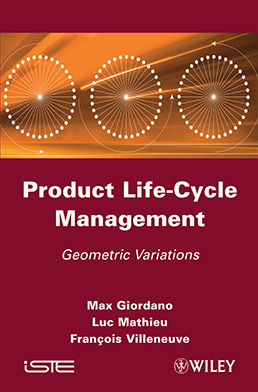
This book gives a comprehensive view of the most recent major international research in the field of tolerancing, and is an excellent resource for anyone interested in Computer Aided Tolerating.
The book is organized into 4 parts. Part 1 focuses on the more general problems of tolerance analysis and synthesis, for tolerancing in mechanical design and manufacturing processes. Part 2 specifically highlights the simulation of assembly with defects, and the influence of tolerances on the quality of the assembly. Part 3 deals with measurement aspects, and quality control throughout the life cycle. Different measurement technologies and methods for estimating uncertainty are considered. In Part 4, different aspects of tolerancing and their interactions are explored, from the definition of functional requirement to measurement processes in a PLM approach.
Part 1. Tolerance Analysis and Synthesis
1. A New Method of Expressing Functional Requirements and how to Allocate Tolerance to Parts, Pierre-Antoine Adragna, Pascal Hernandez.
2. A Parametric Approach to Determine Minimum Clearance in Overconstrained Mechanisms, Philippe Serré, Faïda M'Henni, André Clément.
3. Quick GPS: Tolerancing of an Isolated Part, Robin Chavanne, Bernard Anselmetti.
4. Synthesis and Statistical Analysis for 3D Tolerancing, M. Giordano, P. Hernandez, D. Denimal.
5. Reliability Analysis of the Functional Specification Applied to a Helicopter Gas Turbine, Y. Ledoux, D. Teissandier, S. Sid-Ahmed.
6. Inertial Tolerancing According to ISO GPS, Dimitri Denimal, Max Giordano, Maurice Pillet, Alain Sergent.
7. Tolerance Analysis Based on Quantified Constraint Satisfaction Problems, Ahmed Jawad Qureshi, Jean-Yves Dantan, Jérome Bruyère, Régis Bigot.
8. Tolerance Analysis in Manufacturing using the MMP, Comparison and Evaluation of Three Different Approaches, Mojtaba Kamali Nejad, Frédéric Vignat, François Villeneuve.
Part 2. Simulation of Assemblies
9. A Chronological Framework for Virtual Sheet Metal Assembly Design, J. Segeborn, A. Carlsson, J. S. Carlson, R. Söderberg.
10. A method to Optimize Geometric Quality and Motion Feasibility of Assembly Sequences, D. Spensieri, J. S. Carlson, L. Lindkvist, R. Bohlin, R. Söderberg.
11. Modeling and Simulation of Assembly Constraints in Tolerance Analysis of Rigid Part Assemblies, P. Franciosa, S. Gerbino, S. Patalano.
12. Tolerance Analysis with Detailed Part Modeling, Tobias Stoll, Stefan Wittmann, Harald Meerkamm.
13. Assembly Method Comparison Including Form Defect, Stéphane Morière, Jean Mailhé, Jean-Marc Linares and Jean-Michel Sprauel.
14. Influence of Geometric Defects on Service Life, Laurent Zamponi, Emmanuel Mermoz, Jean-Marc Linares and Jean-Michel Sprauel.
15. GapSpace Multi-dimensional Assembly Analysis, Edward Morse, Xiaobin You.
Part 3. Measurement
16. Impact of the Sampling Strategy on Geometrical Checking Uncertainties, J. Mailhé, J.M. Linares, J.M. Sprauel, J.P. Raynal.
17. Predetermination of Measurement Uncertainty in the Application of Computed Tomography, A. Weckenmann, P. Krämer.
18. Application of Function Oriented Parameters for Areal Measurements in Surface Engineering, Albert Weckenmann, Özgür Tan.
19. Validation of a Reception or Production Control Process by the Inertial Indicator IG, Daniel Duret, Maurice Pillet, Alain Sergent, Dimitri Denimal.
20. Detection of Areas with Critically Reduced Thickness of Formed Sheet Metal Parts Using Two Oppositely Positioned Fringe Projection Systems, A. Weckenmann, N. Petrovic.
21. Variability of the Manufacturing Process in the GPS Framework: A Case Study, M. De Maddis, M.Gandini.
22. Virtual CMM Based Sampling Strategy Optimization, Giovanni Moroni, Stefano Petrò.
23. Impact of Workpiece Shape Deviations in Coordinate Metrology, Gisela Lanza, Jochen Peters.
24. Quality Assurance of Micro-gears via 3D Surface Characterization, G. Lanza, B. Viering.
Part 4. Tolerancing in the PLM
25. Geometric Specification at the Beginning of the Product Lifecycle, Renaud Costadoat, Luc Mathieu, Hugo Falgarone, Benoît Fricero.
26. Ontological Model of Tolerances for Interoperability in Product Lifecycle, Gaurav Ameta, Patrick Hoffmann.
27. A PLM-based Multi-sensors Integration Measurement System for Geometry Processing, Zhao Haibin, Nabil Anwer, Pierre Bourdet.
28. Comparison of Gear Geometric Specification Models Regarding to the Functional Aspect, Jean-Paul Vincent, Jean-Yves Dantan, Gerth Goch, Régis Bigot.
29. Effects of Geometric Variation on Perceived Quality, K. Forslund, R. Söderberg.
30. Geometric Requirement Variations across the Product Lifecycle, Guillaume Mandil, Alain Desrochers, Alain Rivière.
Max GIORDANO is emeritus professor at the University of Savoy France. His research interests include geometry modeling, computer-aided design and computer-aided tolerancing, and he developed the concept of “domain” for the 3-D tolerance analyses and synthesis.
François VILLENEUVE is Professor at the University of Grenoble (France) and vice-director of the G-SCOP research laboratory. His research interests include Computer Aided Process Planning (CAPP), Knowledge Management, Product Design and Tolerancing. In Tolerancing, he is developing a 3D geometrical model for product defects through the product life cycle.
Luc MATHIEU is Professor at the University of Paris-Sud 11, in the Department of Production Engineering (France). He is Director of the Automated Production Research Laboratory (LURPA) in the Ecole Normale Supérieure de Cachan (France). He is also a fellow member of CIRP (International Academy of Production Engineering). His research interests include geometry, computer-aided tolerancing, coordinates metrology and digital production engineering.